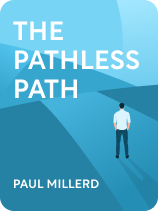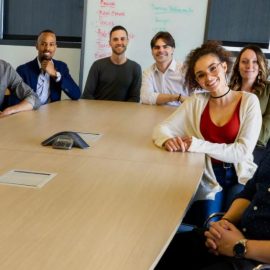

This article is an excerpt from the Shortform book guide to "The Pathless Path" by Paul Millerd. Shortform has the world's best summaries and analyses of books you should be reading.
Like this article? Sign up for a free trial here.
How do you go about finding your niche as a freelancer? How can you be sure that you’ve found it?
Paul Millerd stepped off the default career path and embarked on “the pathless path” of freelancing. He now helps others find their way. He shares two criteria that you need to look for and shares advice on how to reach those goals.
Keep reading to learn how to find your freelancer niche in today’s world.
Find Your Freelancer Niche
Most people assume that deprioritizing work means rashly quitting your job with no backup plan, but Millerd explains that the transition from traditional work to self-employment should be a gradual process. It takes time to figure out what you’re going to do next, and, if you make rash decisions, you might suffer negative consequences that put you in panic mode, which limits your freedom to make the decisions you genuinely want to make.
(Shortform note: As you gear up to leave your traditional job, you might consider quiet quitting—a form of subtle disengagement from the job that involves doing only the bare minimum. That way, you can continue performing as well as you need to in order to keep bringing in a paycheck while refocusing your remaining energy on the next steps.)
Many people are intimidated by the freedom that self-employment gives them—how do you decide what to do with your time? Millerd says that you can find your freelancer niche only via trial and error: Try a new approach to work and see how it feels. If you like it, do it again; if you don’t, try something else. He explains that you’ll know you’ve found your niche when something meets the two conditions of reinvented success: It enables you to live according to your values and contribute something important to the world.
(Shortform note: in What Color Is Your Parachute?, career expert Richard Nelson Bolles says finding your niche is easier with self-reflection. He recommends considering seven factors as you reflect: the kinds of people you want to work with, the conditions you prefer to work under, your skillset, your life purpose, the knowledge you already have, your financial goals, and your ideal place to live.)
Millerd argues that creative work is key to a meaningful life—so your freelancer niche will probably be a creative endeavor. He explains that everyone has an inherent capacity for creativity and that creative expression is becoming more democratically available thanks to the internet—anyone can post self-produced music online, for example.
(Shortform note: Some researchers say that one reason creativity makes life more meaningful is that it deepens your relationship with yourself. Through creative work, you have the opportunity to explore and reflect on your thoughts, beliefs, feelings, and experiences. This process can help you cope better with adversity and produce results you find personally valuable, which is correlated with enhanced joy.)
Millerd also encourages you to share your work online because, although there’s a chance people will dislike it, there’s also a chance that people will love it. And, if they do, it might open the door to further opportunities to do what you love.
(Shortform note: In Steal Like an Artist, writer and illustrator Austin Kleon says you should be careful not to rush the decision to start sharing your creative work online. He explains that when you’re anonymous, you have the freedom to experiment—but once you start sharing your work, people will expect you to keep doing the same thing. When you know you’re ready to share your work, Kleon suggests that you create a website and join social media, where you can share both finished work and sneak peeks at ongoing creative processes.)
Once you find something you want to stick with, engineer a life that enables you to continue doing it. For example, if you discover a passion for music but can’t get paid for it yet, you may have to take on paid freelance work to support yourself until you can make music profitable. Millerd suggests minimizing risks to your security as much as possible: For example, he recognized that freelancing is a fickle industry since work isn’t steadily available or well-paying, so he set himself up with multiple streams of income (including freelance consulting work and selling online consulting courses) so he always has something to fall back on.
(Shortform note: As you work on engineering a life that enables you to continue working in your freelancer niche, it may help to build flexibility into your plans. In Designing Your Life, Bill Burnett and Dave Evans suggest that you generate three five-year plans: one plan that would support your current career path, a backup plan in case the first plan falls through, and a third plan for what you’d do if you weren’t concerned about money or other people’s approval. This could help you adapt to unexpected circumstances that might arise as you pursue your new career.)

———End of Preview———
Like what you just read? Read the rest of the world's best book summary and analysis of Paul Millerd's "The Pathless Path" at Shortform.
Here's what you'll find in our full The Pathless Path summary:
- How to take a non-traditional approach to career success through freelancing
- Why Americans prioritize work and the disadvantages of this lifestyle
- One man's inspiring story of shifting from the workforce to freelancing






